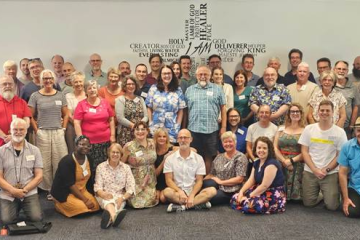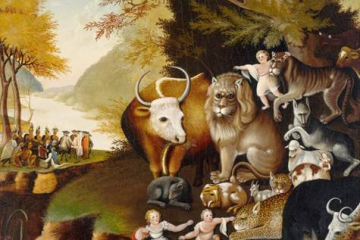10 February 2019
Hospitality …
It is something that we do, it is something anchored in the Gospel story, it is a strong thread in the Judeo-Christian tradition in terms of table fellowship, it is welcoming, it is as Marjorie Thompson in ‘Soul Feast’ describes receiving another from the heart, providing for the need, and comfort and delight of another with openness, freedom, tenderness and joy.
I remember experiencing that on the Camino. We had just walked a long day, it was our second day. It was wet, and miserable. And we were tired. Margaret and I had been joined by a couple of other walkers, pilgrims, one from Germany, another from Switzerland. We had arrived at a town and like most pilgrims and as directed by the Camino guide, we headed straight to the Catholic Church where we were led to believe would be lodging: an albergue. When we got to the church there was a sign: the albergue was closed but if you are in need ring the bell. We rang the bell, and no-one came. We went around to the main door, and stumbled on some people in the church and asked what we could do for accommodation. They said call Maria. ‘How’. ‘Oh she is usually around, just wait … oh tell you what we will call her.’ Some 15 minutes and diminutive elderly Portuguese woman appeared, dressed in black, with a smile that beamed at house. She welcomed us in open arms. She said ‘Come, you poor pilgrims, come to my house’ . Which we did, and there we stayed the night. But her hospitality did not cease then. She came in later with food, bread, fruit, and home-made soup. All of us were overwhelmed with her genuine love and openness to welcome us. The next day we rose at 5.30 and she provided breakfast, and walked with us in the misty rain to the outskirts of town, and said goodbye, ‘Buen Camino’ – ‘Good walking’. Dios te bendiga – God bless you. Our bodies and feet were weary, she welcomed us, we were wet, she gave us a place, and she fed us and walked with us to wish us well on the journey. We knew nothing of her but through her could say we learned so much about hospitality, such that looking back when you experience it, this generous heartfelt tender embrace then you know what it is, then you know how central it is to the heart of God … it is love enacted love. And with it, disharmony melts, criticism calms, and discontent dissolves … when you know it, feel it, have experienced it there is this desire to embrace another with the same touch of God.
In the Scriptures, as mentioned, hospitality is seen in the various occasions of table fellowship, its seen when Jesus sat at the table with the culturally unacceptable … breaking boundaries of protocol and power to embrace another with human dignity – you know that, and today I would like to say that hospitality is more than a meal: it is an attitude of heart. It is a spiritual disposition that is central to what this sermon series is about in respect of our journey to explore and deepen our faith. Thompson writes that Hospitality begins with God … in the created order we see and know God’s benevolence and grace … and then later in Jesus, God’s supreme gift of self, to show us the Way, to enliven us and help us understand the new creations possible in the faith to all who seek God. Hospitality begins with God and is the very nature of God.
Some weeks ago I went to see some friends at the Community of the Transfiguration just outside of Geelong. They are a Baptist Order, a monastery. People who practice a regular routine of prayer and live in a shared community. I went to see whether they would be open to coming to our church to share their story and introduce us to their practice of contemplative prayer. They said ‘yes’ and we will try to work out the details for later on this year but, while I was there, one of the sisters formerly an academic and Uniting Church minister Sister Miriam, told me about a paper she had provided to an Anglican bishop in the UK, around the question of the nature of God. And it discusses the two occasions when God reveals the divine name to Moses in Exodus.
The first is at the burning bush at the mountain of God – Ex 3:1-15. God called to Moses out of the bush and said: ‘I AM who I AM. To those who ask say ‘I AM sent me to you.
In Hebrew culture to reveal one’s name is to reveal one’s nature, one’s character. The narrative repeats it three times to ensure its etched clearly in listeners ears. And interestingly Miriam’s translation is not that God says ‘I AM” but rather a future imperative ‘I WILL BE THERE’.
But the next revelation is detailed at ch 33 and 34 and more emphatic for our purposes. It is again on the mountain, but we must remember too that earlier the people of Israel had fled and nearly died, and then fought a great battle against Amalek – enemies of the people of Israel – and they were confident, strident, haughty, and despite the forms of order detailed in the next few chapters, we find the people have made themselves a golden calf – a symbol of their arrogance and dismissal of God. as the story goes God is furious and intends to abandon them, but Moses pleads to God on their behalf and convinces God to remember that ‘they are your people’. And so God responds vss 14ff: ‘You have found favour in my eyes, and I know you by name.’ Moses said: ‘Show me your glory (or your substance’), I pray’. And God said: ‘I will make all my goodness pass before you … I will call out the name before your face that – I will GRACE whom I grace (hannun) … that I have MERCY on whom I have mercy (rahum)
And then ch 34 … the Lord descended in a cloud and stood there next to him, and called our the NAME
I AM, I AM, God merciful (rahum) and Gracious (hannun) …
After this God makes a covenant with the people who have betrayed him, declaring his faithfulness because that is God’s nature. Rahum and Hannun Merciful and Gracious. Even though people have been taking the wrong path, were disloyal, rebellious haughty in their invincibility and righteous arrogance God reveals self to them, the essence of God’s nature – Rahum and Hannun – Merciful and Gracious. But the word rahum can be further understood says Miriam not just as merciful but as something more profound. The Hebrew root of this word rendered in the Greek is often commonly referred to as mercy but the boundaries are blurred because it really should be translated as womb. God is merciful in the meaning of God is the womb of all that is … something more visceral, deeper, more human, something that evokes a nature and essence of God that is tender and protective and nurturing.
It gets to this: here is this revelation of the divine name, we catch a glimpse of God’s nature. Rahum and Hannum – Tender, Womb like and Gracious, generous. It’s as if the ancient writer is saying in beautiful poetic style: you think God is the Conqueror that that is God’s nature and essence, think again: God is Nurturer, Tender, Womb like and gracious.
And if that is God, and if that is the essence of who God is, then so we who are God’s beloved. It demands that in our way of being, that in our way of Christian adoration and faith, that we too enliven that which we have deep within which is of God … that deep feeling of warmth and tenderness and mercy, the gentle area of our soul, that carries with it the natural desire to protect, to care and secure good towards all of life, and all of God’s creation … it replaces wrath and conquest and invites us to love itself … to enact love … Hospitality.
And I mention all of this because yes hospitality is what we do, BUT before we can practice hospitality, before even defining it, we need first to experience it. To understand the depth of God and God’s essence and nature and to feel it. Thomson does a really good job of describing it, but with you now, as a community of faith here, my invitation is for each of us to review deep within that sacred place of your soul, to stop and to look and search in your heart and seek out that place of deep love because there there is God. And I invite you to see it, and hear it, and feel it … to find this place, to experience this deep place within requires you to open yourselves to the womb like and generous essence of God …
To do hospitality we need to experience it … just like I did on the Camino with the Catholic woman who simply embraced us as strangers.
To do hospitality we should know that the essence of it is grounded in a God who is tender and gracious and womb like and who invites us all to experience that generous love … and in this experience and in this understanding and knowing, love will spill out in our behaviour … like champagne when you shake it … it will mean that we will have a heart for each other, its effect will be that we will soften the rigour of our righteous claim to anything … it will mean that we can find a calm and stillness within because we know we are loved
… all the things that you know as people of faith and probably heard countless times as part of the faith and maybe have lost? Are we hospitable here? Generous, gracious? Do we reflect the tender embrace of another as God does of us? Because when we love, truly love like that, like Maria on our pilgrim walk, we show something that can be transformative to all we meet in the Workplace, in our neighbourhood, in our church and when we practice that here … we truly become visible tangible real people of faith. That is Hospitality.


